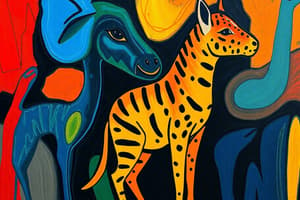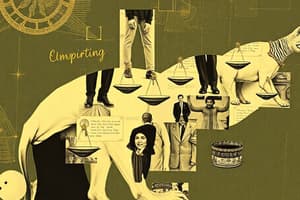Podcast
Questions and Answers
What is the primary focus of ethology?
What is the primary focus of ethology?
- Studying animal behaviour under natural conditions (correct)
- Investigating the evolutionary history of animal species
- Studying animal behaviour in laboratories
- Developing new breeds of domestic animals
Who is regarded as one of the founders of modern ethology?
Who is regarded as one of the founders of modern ethology?
- Charles Darwin
- Nikolaas Tinbergen
- Konrad Lorenz (correct)
- Karl von Frisch
What is the process by which some nidifugous birds bond instinctively with the first moving object they see?
What is the process by which some nidifugous birds bond instinctively with the first moving object they see?
- Habituation
- Instinct
- Learning
- Imprinting (correct)
What is the title of Nikolaas Tinbergen's 1951 publication?
What is the title of Nikolaas Tinbergen's 1951 publication?
What is the significance of the waggle dance in honey bees?
What is the significance of the waggle dance in honey bees?
What is the primary focus of Karl von Frisch's research?
What is the primary focus of Karl von Frisch's research?
What is behaviour in animals, in its broadest sense?
What is behaviour in animals, in its broadest sense?
Why do different individuals or species react to the same stimulus in different ways?
Why do different individuals or species react to the same stimulus in different ways?
What is one of the importance of studying animal behaviour?
What is one of the importance of studying animal behaviour?
Which system regulates metabolism, reproductive cycles, and broodiness in animals?
Which system regulates metabolism, reproductive cycles, and broodiness in animals?
What is the primary function of the pituitary gland in regulating animal behaviour?
What is the primary function of the pituitary gland in regulating animal behaviour?
What determines the behavioural responses of animals?
What determines the behavioural responses of animals?
What is the role of the nervous system in regulating animal behaviour?
What is the role of the nervous system in regulating animal behaviour?
What is the result of the sum of all muscle contractions and hormonal secretions?
What is the result of the sum of all muscle contractions and hormonal secretions?
What is the importance of studying animal behaviour in terms of animal welfare?
What is the importance of studying animal behaviour in terms of animal welfare?
Which of the following is an example of an external factor that affects animal behaviour?
Which of the following is an example of an external factor that affects animal behaviour?
What triggers the imprinting process in birds?
What triggers the imprinting process in birds?
How long does the imprinting process typically take in birds?
How long does the imprinting process typically take in birds?
What is cultural learning?
What is cultural learning?
What is an example of observational learning?
What is an example of observational learning?
What is teaching in the context of cultural learning?
What is teaching in the context of cultural learning?
What occurs when individuals become interested in an object as a result of observing others interacting with it?
What occurs when individuals become interested in an object as a result of observing others interacting with it?
What is the primary requirement for an animal to show a certain behavioural response?
What is the primary requirement for an animal to show a certain behavioural response?
What is the term used to describe the behaviours that are present at birth?
What is the term used to describe the behaviours that are present at birth?
What is the characteristic of animals that are classified as precocious?
What is the characteristic of animals that are classified as precocious?
What is the type of learning that involves the permanent weakening of a response as a result of repeated stimulation unaccompanied by reinforcement?
What is the type of learning that involves the permanent weakening of a response as a result of repeated stimulation unaccompanied by reinforcement?
What is the term used to describe the process that produces adaptive changes in individual behaviour as a result of experience?
What is the term used to describe the process that produces adaptive changes in individual behaviour as a result of experience?
Which type of learning involves the improvement of a response through repeated attempts?
Which type of learning involves the improvement of a response through repeated attempts?
What is the characteristic of altricial animals?
What is the characteristic of altricial animals?
What is the result of repeated exposure to a stimulus in habituation?
What is the result of repeated exposure to a stimulus in habituation?
What is the main difference between classical conditioning and instrumental conditioning?
What is the main difference between classical conditioning and instrumental conditioning?
What is the term for the process by which a behavior that is learned through reinforcement becomes extinct when the reinforcement is withheld?
What is the term for the process by which a behavior that is learned through reinforcement becomes extinct when the reinforcement is withheld?
What type of learning involves solving a problem through reasoning and insight?
What type of learning involves solving a problem through reasoning and insight?
What is the term for the process by which young animals follow the first moving object they encounter after hatching?
What is the term for the process by which young animals follow the first moving object they encounter after hatching?
What is the result of severe malnutrition in early life on an animal's ability to solve complex problems?
What is the result of severe malnutrition in early life on an animal's ability to solve complex problems?
What is the term for the unconditioned stimulus in classical conditioning?
What is the term for the unconditioned stimulus in classical conditioning?
What is an example of avoidance behavior in instrumental conditioning?
What is an example of avoidance behavior in instrumental conditioning?
What is the term for the type of learning that involves associating a behavior with a consequence, such as receiving food or avoiding shock?
What is the term for the type of learning that involves associating a behavior with a consequence, such as receiving food or avoiding shock?
Flashcards are hidden until you start studying
Study Notes
Imprinting
- Imprinting occurs in birds within 36 hours of hatching, where they follow their mother based on her vocalization.
- If imprinting doesn't occur within a few days of hatching, it may never occur at all.
Cultural Learning
- Cultural learning is the process of passing on socially learned information.
- It is greatly influenced by adult socialization and their interaction with their young.
- Types of cultural learning:
- Observational learning: learning through observing others' behavior.
- Imitation: exactly replicating the behavior of another.
- Stimulus and local enhancement: becoming interested in an object due to others interacting with it.
- Teaching: adjusting behavior to increase the probability of achieving a desired outcome.
Ethology
- Ethology is the scientific and objective study of animal behavior under natural conditions.
- It is an evolutionarily adaptive trait.
Famous Ethologists
- Konrad Lorenz: investigated the principle of imprinting in geese and is a founder of modern ethology.
- Nikolaas Tinbergen: published "The Study of Instinct" in 1951, summarizing ideas on innate behavioral reactions and adaptiveness.
- Karl von Frisch: investigated sensory perceptions of honey bees, including the waggle dance.
Animal Behaviour
- Animal behavior refers to everything animals do, including movement, activities, and underlying mental processes.
- Importance of studying behavior:
- Indicates health and welfare.
- Enables design of housing and husbandry systems.
- Helps understand group size and reproductive success.
Physiological Concept of Behaviour
- Behaviour is regulated by the nervous system and endocrine system.
- Nervous system: transmits information from external and internal factors to the CNS, leading to expression of behavior.
- Endocrine system: regulates metabolism, reproductive cycles, and other functions.
Causes of Behaviour
- Behaviour is a result of muscle contractions and hormonal secretions.
- Genetically programmed behaviors can be stereotyped and cannot be changed.
Learning and Experience
- Heredity: affects growth and development of body parts, including sensory and motor organs.
- Instinct or reflexes: inherent behaviors present at birth, such as swimming without learning or maternal behavior.
- Altricial and precocious categories: divide animals based on their ability to exhibit skills and abilities at birth.
Types of Learning
- Habituation: permanent weakening of a response as a result of repeated stimulation without reinforcement.
- Conditioning:
- Classical conditioning: learning to respond to an artificial stimulus in the same way as a natural stimulus.
- Instrument or operant conditioning: associating behavior with a particular outcome in the environment.
- Insight learning: ability to respond correctly at the first time when encountering a new situation, prevalent in higher mammals.
Studying That Suits You
Use AI to generate personalized quizzes and flashcards to suit your learning preferences.



